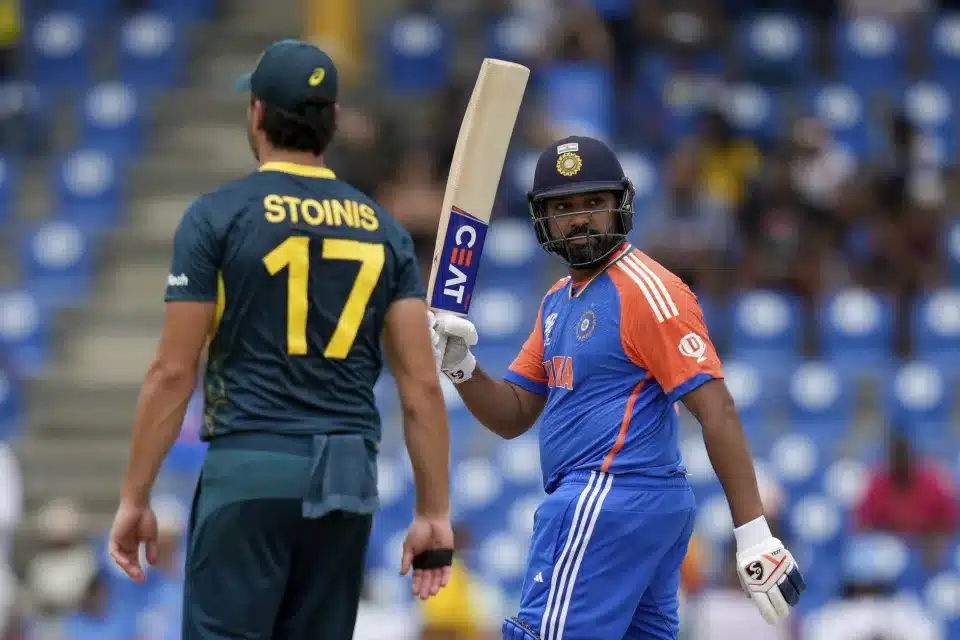In a thrilling turn of events, Afghanistan secured a spot in the Twenty20 World Cup semifinals for the first time, joining India in the last four and eliminating the reigning champion Australia. Captain Rohit Sharma played a pivotal role, smashing 92 runs off just 41 balls to lead India to a 24-run victory over Australia in St. Lucia. Meanwhile, Afghanistan secured their semifinal berth by defeating Bangladesh by eight runs with seven balls to spare in a rain-affected match at Kingstown, St. Vincent. The outcome of the match had the fate of all three teams hanging in the balance, but it was Afghanistan who ultimately advanced to face South Africa in the semifinals on Wednesday. On the other hand, the undefeated India will take on defending champion England on Thursday.
Sharma displayed an exceptional performance in this tournament, achieving the fastest half-century in just 19 deliveries. With eight sixes and seven boundaries, he played a crucial role in India’s total score of 205-5.
Australia’s Travis Head put up a strong fight with a rapid 76 off 43 balls, but his teammates struggled against the spinners Kuldeep Yadav (2-24) and Axar Patel (1-21), resulting in a restricted score of 181-7.
Reflecting on his performance, Sharma expressed his satisfaction, stating, “It’s quite fulfilling, especially when you play like that.” He emphasized the importance of maintaining the same approach in the semifinals, understanding the individual requirements in different situations, and playing with freedom.
Sharma set the tone early on, smashing Mitchell Starc’s second over for an impressive 29 runs, which included three sixes.
Unfortunately, Virat Kohli faced another disappointment, getting caught at midwicket off a short ball from Josh Hazlewood, resulting in his second duck of the tournament. Kohli has only managed to score 66 runs in six games, while his fellow veteran Sharma remained unaffected by a brief rain delay.
“I didn’t focus on the 50s and 100s, my goal was to maintain the same tempo throughout my batting,” Sharma expressed. “I aimed to keep the bowlers guessing about where my next shot would be, and I believe I achieved that.”
Out of his total runs, 76 were scored through boundaries and sixes. He made history by becoming the first player to hit 200 sixes in T20 internationals, surpassing both Kohli (4,103) and Pakistan’s Babar Azam (4,145) as the leading scorer in international cricket’s shortest format.
Sharma was on his way to achieving the first century of the tournament when he was dismissed by Starc’s yorker in the 12th over.
However, middle-order batsmen Suryakumar Yadav (31), Shivam Dube (28), and Hardik Pandya (27) ensured that India reached their joint highest total against Australia in the men’s T20 World Cup history.
Among the bowlers, only Hazlewood (1-14) consistently hit the right lengths in his four overs.
Australia suffered an early setback as they lost David Warner to Arshdeep Singh’s impressive bowling performance, taking 3 wickets for 37 runs in his first over. However, Travis Head and captain Mitchell Marsh fought back with a quick-fire partnership of 81 runs for the second wicket.
Marsh was eventually dismissed by a brilliant one-handed catch from Harshal Patel, while Glenn Maxwell fell victim to a delivery from Kuldeep Yadav, getting bowled out on 20 runs in the 14th over.
Once Head was deceived by Jasprit Bumrah’s slower ball, Australia’s momentum dwindled, and their challenge came to an end.
Reflecting on the loss, Marsh expressed disappointment, acknowledging that India outplayed them. He also praised the destructive abilities of Rohit Sharma, who had a phenomenal start to the match.
In another match, Afghanistan batted first and set a seemingly modest target of 115-5, a score that appeared insufficient for them to secure a spot in the semifinals.
However, in a thrilling second innings with rain looming and the attention of three nations captivated, Bangladesh fell short in their frantic attempt to chase down Afghanistan’s total in just 12.1 overs. Had they succeeded, Bangladesh would have secured a place in the semifinals.
At 1:10 a.m. local time, the final wicket of Bangladesh fell, securing Afghanistan’s victory with a total of 105. Despite the rain interruptions that added drama and revised targets to the match, spectators were captivated until the very end, witnessing the fluctuating fortunes of both teams.
In the thrilling conclusion of the Super Eight stage, four possible outcomes emerged. If Afghanistan emerged victorious, they would advance. In the event of rain and a match without a result, Afghanistan would still progress.
A win for Bangladesh would eliminate Afghanistan from the competition and send Australia through. However, if Bangladesh managed to win within 12.1 overs, they would advance on net run-rate, while both Afghanistan and Australia would be eliminated.
With Afghanistan only able to make a modest 115 runs after choosing to bat, all of these scenarios remained possible. Eventually, rain shortened the chase to 114 runs from 19 overs.
In a thrilling match, Naveen-ul-Haq proved to be the hero as he dismissed Taskin Ahmed and Mustafizur Rahman in the 18th over, securing victory for Afghanistan. Naveen finished with impressive figures of 4-26. Litton Das played a crucial role, remaining unbeaten on 54 runs for Bangladesh.
Reflecting on the momentous win, Naveen expressed his delight, stating, “We have put in immense effort over the past few years, eagerly anticipating this day. When it finally arrives and becomes a reality, it feels surreal.”
As Naveen shared his thoughts, the Afghanistan players jubilantly carried their captain, Rashid Khan, around the field amidst the falling rain.
Rashid, in a subsequent television interview, acknowledged the significance of the win, saying, “This victory will be celebrated greatly back home. Our performance in this World Cup has made our nation immensely proud. I am thrilled with the way our team has performed.”
